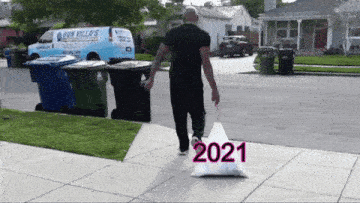
If you feel a splash of annoyance every time you see a #newyearnewme hashtag, we’re right there with you. In 2022, even the concept of New Year’s goals has become a bit cringe. As our Instagram and LinkedIn feed fill up with lofty ambitions, they can trigger a bit of eye-rolling.
Are all of these big goals we’re seeing really attainable? And is it really necessary to share them on social media?
The big goals we set every January, often after a rather silly season, rarely last. According to the New York Times, over 50% of new year’s resolutions fade throughout the year, and a whopping third of all resolutions are discarded by January.
We get it. Setting goals and sticking to them is tough (and a lot of the time, not very fun). But whether you aim for big changes in your personal or professional life, you’ll need to reach your goals to make them happen.
Here’s the big tip, don’t rely on morale alone to make it happen. Especially in 2022.

There are very few of us that can achieve our goals fuelled by a positive mental attitude alone. For most of us, we need a few more tips and tools to keep our eyes on the prize.
We need to trick ourselves into staying motivated. And we can trick ourselves with science!
How can we achieve new year’s resolutions in uncertain times?
After nearly two years of rollercoaster events, it’s not surprising that some people are feeling a little hesitant when it comes to goals. For all the people who have resolved to travel the world in 2020 – you’ll know what we mean.
The pandemic throws obstacles of all shapes and sizes between us and our goals. After you’ve jumped through so many hoops in the last 24 months, you’re more likely feeling fatigued than focused.
Still, we can’t let uncertainty get the better of us. There’s a chance you may not achieve the goals you set this year, but don’t set them at all – you definitely won’t achieve them.
Under the cloud of uncertainty, the best thing we can do is load up on tools and knowledge about goal setting and our brains. Why do goals so often fail? How can we be more resilient in the face of challenges? How can we use scientific insights to work smarter, not harder, when it comes to our resolutions?
Why do new years resolutions fail?
There are a few reasons why people fall off the wagon before February hits. When it comes to goals, there are mental hurdles everywhere.
We’ve set goals that are too ambitious
Here’s looking at you, #newyearnewme-ers.
Although it might seem like a nice thought to start a side business, double last year’s KPI numbers, run a marathon, read 50 books and master the perfect winged eyeliner – you’re just one person, my friend.
The more impossible these goals are to achieve, the more likely you are to get frustrated and throw in the towel altogether.
We don’t make a plan
Let’s say that 2022 is the year that you’re going to go for that big promotion you’ve been thinking about.
Are you going to go to work and wait to be noticed? No. You need to make a plan.

We experience setbacks or failure
The journey towards our goals is not a linear one. It’s normal to experience some turbulence in regular times, let alone when we’re still living through a global pandemic.
If it were easy, everybody would be doing it. If it wasn’t as straightforward as you thought it would be, or you encounter some hurdles, just keep going. Pivot if necessary, resist the need for instant gratification and ride the waves of both the successes and setbacks through the year.
They’re not actually our goals
We talk a lot about the why when it comes to goal setting.
Motivation to achieve our goals has to come from us. A big reason why resolutions are thrown out is because they’re not actually our goals – they belong to someone else. Whether it’s a friend, colleague, or society itself; if your goal is fuelled by external values, it will be near impossible to stay motivated.
If your goal is to travel because you just want the social media pics, if everyone else around you is buying property so you feel like you should too, or if you feel like you need to drop 10kg to meet impossible beauty standards – it’s time to reconsider.
20 science-approved ways to achieve your new year’s resolution
Here are the best scientifically-backed hacks for smashing your goals this year.
1. Dream big, but be realistic
When setting your goals, you need to walk the tightrope between big ambitions and what’s actually possible.
According to Harvard research, dream too big, and you risk disappointment and fatigue, dream too small, and you will never push your boundaries.
2. Reflect on what you did, or didn’t achieve, in 2021
It’s no coincidence that a lot of people have the same resolutions on repeat. Common things like; losing weight, getting fit, starting a business, quitting smoking or saving more money. While there’s nothing necessarily wrong with these pursuits, they can be repetitive and vague.
Instead, consider reflecting on the year that was to personalise the year ahead. As 2021 was another tumultuous twelve months, there are lots to reflect on.

As psychologist Joanne Dickson wrote of goal setting after 2020;
“Our personal reflection on 2020, and the key lessons we took away from it, will help determine our hopes and visions for the year ahead. 2020 was marked by prolonged lockdowns, isolation, loss and shifts in opportunity. But personal growth and strength can stem from such experiences, as past research has revealed.
Living through difficult and stressful times can pave the way for a greater appreciation for life, deeper self-understanding, and increased personal resilience (which means being able to bounce back quicker).”
3. Understand the motivation behind your goals
Even if it’s not responsive to last year, understanding the reasoning behind your goals is key.
When the going gets tough as you work towards your resolution, it’s not the work ahead of you that will keep you motivated. It’s the payoff at the end.
When you’re establishing your goals for 2022, think about why you want them. This can stop you falling into that common trap of reaching for a goal that doesn’t align with your personal values.
Say your goal is to save $10,000. Why? Is it for a deposit for a property to make a home in? Is it to go towards your dream wedding? Is it for the motorbike you’ve always wanted?
Know your why, and you can reach for it when you feel like giving up.
4. Write down your goals
“People who write down their goals feel a greater sense of accountability and have a much higher chance of accomplishing them,” psychologist Elizabeth Ward told Self.
It’s one of the oldest tricks in the (note)book, but making a note of your goals is essential. It’s annoying but true; If you don’t write down your goals from the get-go, you’ll likely have forgotten them within a few days.
5. Keep your goals and motivations visible
As the old saying goes – out of sight, out of mind.
We’re all guilty of writing down our goals with every intention of ticking them off one by one. But what about after the new years’ refresh wears off. More than once, I’ve found the note of my goals months later, gathering dust.
Writing down your goals is one thing, but where you display your goals also matters. Home offices are the perfect place to put them on the wall in a highly visible spot. Display them in an obvious place, and use colours or big letters so that they consistently catch your attention.
As a wise person (me) once said;
“a note of a goal gathering dust is as good as a goal itself gathering dust.”
6. Make it fun
When we are trying to achieve our goals, we can sometimes summon a sort of ‘punishment’ mentality.
Getting fit is a good example. We might decide that we want to exercise more, and hours on the treadmill or stationary bike is the easiest way to do that. Well, it might be the simplest approach, but it’s also probably the most boring, and you’ll most likely disengage pretty quickly.
Instead, you should take the time to look for something that you actually enjoy doing. Whether it’s salsa dancing or a pilates class, rock climbing or ocean swimming – finding something you genuinely enjoy will make it more achievable.
Remember, just because it’s the end goal that you want to achieve, it doesn’t mean you can’t enjoy the path to it.

7. Make a plan
To stay on task, you need to have more than good intentions.
A 2015 study from Harvard and the University of Pennsylvania found that creating a plan for a goal was critical in achieving it. Researchers spoke to a group of people who had intentions to vote in an upcoming election. With half the group, they simply asked if they were going to vote. With the other half, they asked when, where and how they would vote.
The result? The group that talked through their plan to vote were twice as likely to actually do it.
8. Break your goals down into easy steps
Now that you have your goals documented and on display, it’s time to think about how you’ll achieve them.
Harvard research suggests you start small and break goals down. You also shouldn’t be afraid to give yourself a high-five from step one.
“Just getting to first base can build your confidence to tackle — and succeed at — more difficult tasks… If you start every plan with “Make list,” you’re guaranteed to check one box off quickly.
“That’s no joke: a study on loyalty programs that aim to motivate consumers found giving people two free punches on a frequent-buyer card encouraged repeat business. So break hard jobs down into smaller line items, and enjoy breezing through the easy tasks first.”
9. Share your goals with an accountability partner
There is some conflicting opinion about how, and to what degree, to share your new year’s goals with your friends and networks.
As careers expert Kathy Caprino writes in Forbes, there is a right (and wrong) kind of person to share your resolutions with. Instead of sharing it willy nilly, find a trusted person to be your accountability partner.
“The right accountability partner believes in you and your big goal before it’s “hatched,” and serves as an honest and true mirror that reflects back to you how you’re currently approaching things…”
“We don’t generally make big changes alone or in a vacuum. Most of us need some great outside help and an ongoing accountability structure to keep going towards our highest growth just when we want to bail.”
10. Assist others with their goals
Just as someone will be a great accountability partner to you, playing the same role for someone else will help you stay inspired.
Being there for others not only makes us feel great and forge wonderful relationships, it can galvanise us to carry on down our own path. Either talk to your own accountability partner about returning the favour, or help someone else pay it forward. Who doesn’t love sharing success?

11. Visualise what will happen when you achieve your goal
OK, I know this is starting to sound a little ‘The Secret’, but bear with me here.
Mentally conjuring an image of us achieving our goals can impact our behaviour as we work towards them. Psychology Today suggests that visualisation can influence memory, attention, perception and motor control. It’s a way of actively training and preparing for great performance, all within the confines of your imagination.
12. Establish routines
Let’s jump back to our exercising example. If I want to run a marathon, would it be better for me to hit the pavement every day at 7am, or squeeze a jog into my day whenever I have a spare hour?
Forming habits put our brain into cruise control, pushing us towards our success. The fancier way of saying it is that you’re creating a ‘neural pathway’. As Christine Carter PhD writes for TED, “Once you hardwire a habit into your brain, you can do it without thinking and, more importantly, without needing much willpower or effort.”
13. Don’t forget, some progress is better than no progress
Christine Carter also writes about how a little progress, even the tiniest iota of progress, is better than no progress. Having massive expectations is an easy way to sabotage yourself.
She calls this the ‘better than nothing’ effect.
“I started exercising again by running for only one minute at a time — yes, that’s right, 60 seconds…”
“These days, I usually run for 15 or 20 minutes at a stretch. But on the days that I’m totally lacking in motivation or time, I still do that one minute. And this minimal effort always turns out to be way better than nothing.”
“Try doing one better than nothing behaviour. See how it goes. Your goal is repetition, not high achievement. Let yourself be mediocre at whatever you are trying to do, but be mediocre every day.”
14. Get up when you slip up
Sometimes, there will be days when even the ‘better than nothing’ effect will not be available to you. Maybe you might find yourself, say, stuck inside for weeks at a time or stricken with a mysterious illness (sound familiar?).
There are so many factors beyond our control that can derail our progress. Especially during uncertain times, we need to not beat ourselves up for letting our focus slip.
Take a deep breath, return to this list, and pick a tool to help you get back on that wagon. Tip 18 might be just the ticket to help you reset!
15. Check in at regular intervals
You’ve got your goals, and you’ve got your plan? Great, pull up your calendar.
Mark in key dates (we suggest doing this monthly) to check in on how your goals are going.
Ask yourself some key questions, like;
- What have I done this month to move closer to my goal?
- How am I feeling about my goal’s progress?
- Do I need to change my approach to be more focused?
- What habits can I establish to make working towards my goal easier?
16. Track your progress
When you check in mentally with your goals, you should also track your progress. For professional goals, our favourite way to do this is with OKRs.
OKRs are a powerful goal-setting methodology that helps employees understand how the work that they do contributes to your business’ overall success. It’s a high-impact framework used by the world’s leading companies.
OKRs consist of an Objective, which defines a big goal to be achieved (the ‘what’ or ‘where do we want to go’), and up to 5 Key Results, which measure progress towards the objective (‘how do we know we’re making progress?’).
17. Use ‘temporal landmarks’ to refresh your motivation
Why is it that we feel compelled to set resolutions on January 1st each year?
A new year is what’s known as a ‘temporal landmark’. According to research by academic Katherine Milkman (PhD), these landmarks make us feel like we’ve had a fresh start. They differentiate the period of time when our goal has started to slow, and signify a new period of time when we feel like we can start again.
The good news is that a new year is not the only temporal landmark that you can use to gain this feeling. Birthdays, returning from holidays, a new month or even a new week are all opportunities to reboot.
18. Find inspiration
When you feel inspired, you can more easily achieve your resolutions – and this isn’t just anecdotal.
Researcher Marina Milyavskaya’s study on inspiration found that people who felt more inspired were more motivated to reach their goals. This then becomes cyclical, people who achieved inspired goals then felt more inspired to set more ambitious goals!
19. Reward yourself along the way
We have another academic phrase for you, “operant conditioning”.
The idea of operant conditioning is simple; reward yourself for doing something, and you’ll be happy to do that thing again.
After you complete each small step of your goal, throw yourself a little bone. Whether that’s taking yourself to lunch, watching an episode of your favourite TV show or buying a new little gadget, enjoy the small success.

20. Celebrate achieving your goals!
This is operant conditioning on a larger scale. When you achieve your goals – make sure you take the time to celebrate it in a big way!
It seems obvious, but humans are often set on having a ‘what’s next’ mentality. We move onto the next goal without recognising our successes.
So reflect on your why, look back on all of your hard work, share your wins and pop the champagne! Taking the time to properly pat yourself on the back will motivate you to set even bigger and better goals for 2023.
New year, new me…aningful goal-setting tools.
Objectives and Key Results (OKRs) are one of the best ways to set and track your team’s goals for 2022.
With some of the world’s biggest companies (think: Google, Netflix, Salesforce..,) using the OKR framework, we think more businesses need to know what the fuss is all about. We wrote this guide to OKRs to do just that!
Career Progression Plan Template


